tow RENAULT CLIO 2009 X85 / 3.G User Guide
[x] Cancel search | Manufacturer: RENAULT, Model Year: 2009, Model line: CLIO, Model: RENAULT CLIO 2009 X85 / 3.GPages: 264, PDF Size: 15.68 MB
Page 128 of 264
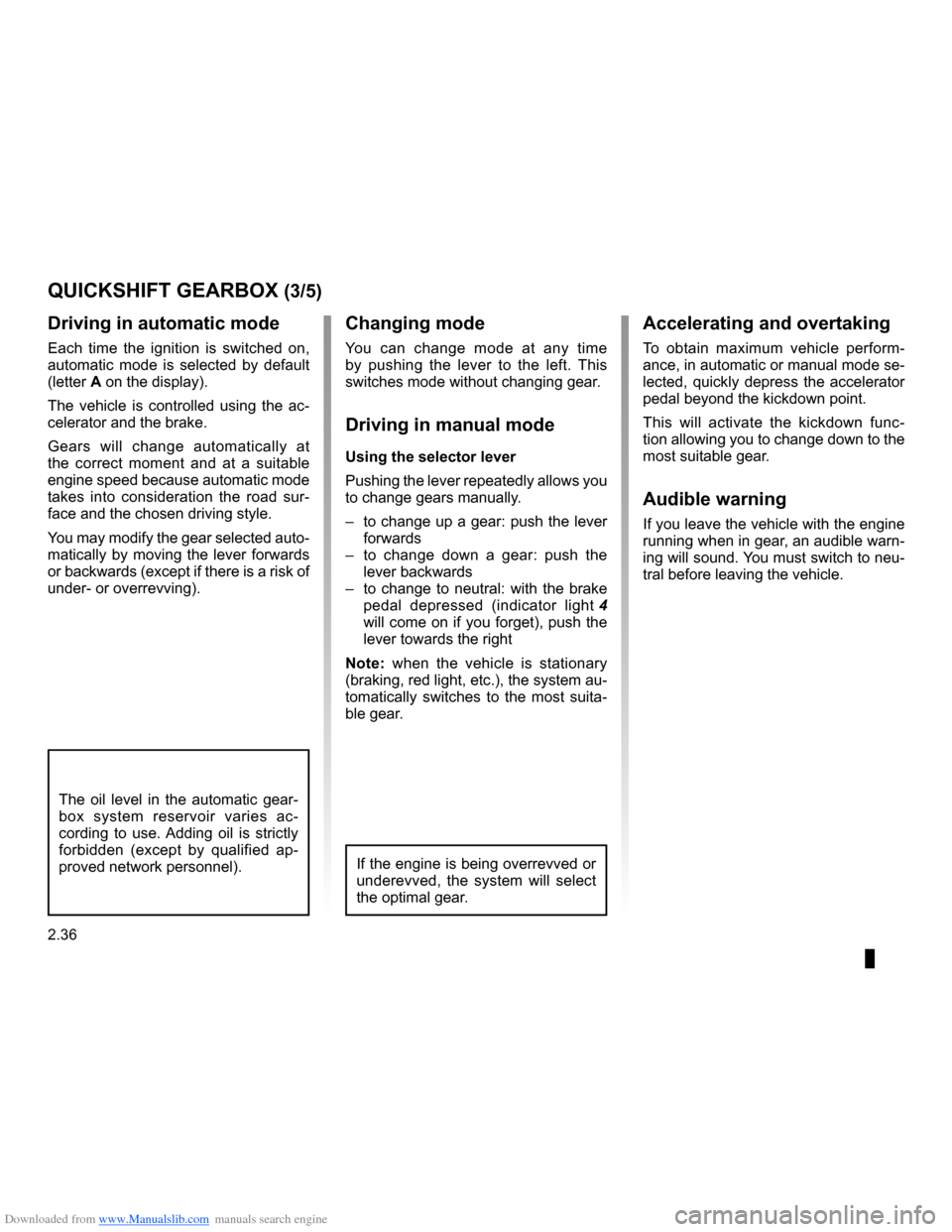
Downloaded from www.Manualslib.com manuals search engine
2.36
ENG_UD12578_2Boîte de vitesses Quickshift (X85 - B85 - C85 - S85 - K85 - Renault)\
ENG_NU_853-3_BCSK85_Renault_2
JauneNoirNoir texte
Driving in automatic mode
Each time the ignition is switched on, automatic mode is selected by default (letter A on the display).
The vehicle is controlled using the ac- celerator and the brake.
Gears will change automatically at the correct moment and at a suitable engine speed because automatic mode takes into consideration the road sur- face and the chosen driving style.
You may modify the gear selected auto- matically by moving the lever forwards or backwards (except if there is a risk of under- or overrevving).
The oil level in the automatic gear- box system reservoir varies ac- cording to use. Adding oil is strictly forbidden (except by qualified ap-
proved network personnel).
QUICkSHIFT GEARBOX (3/5)
If the engine is being overrevved or underevved, the system will select the optimal gear.
Changing mode
You can change mode at any time by pushing the lever to the left. This switches mode without changing gear.
Driving in manual mode
Using the selector lever
Pushing the lever repeatedly allows you to change gears manually.
– to change up a gear: push the lever
forwards
– to change down a gear: push the lever backwards
– to change to neutral: with the brake
pedal depressed (indicator light 4 will come on if you forget), push the lever towards the right
Note: when the vehicle is stationary (braking, red light, etc.), the system au- tomatically switches to the most suita- ble gear.
Accelerating and overtaking
To obtain maximum vehicle perform- ance, in automatic or manual mode se- lected, quickly depress the accelerator pedal beyond the kickdown point.
This will activate the kickdown func- tion allowing you to change down to the most suitable gear.
Audible warning
If you leave the vehicle with the engine
running when in gear, an audible warn- ing will sound. You must switch to neu- tral before leaving the vehicle.
Page 130 of 264
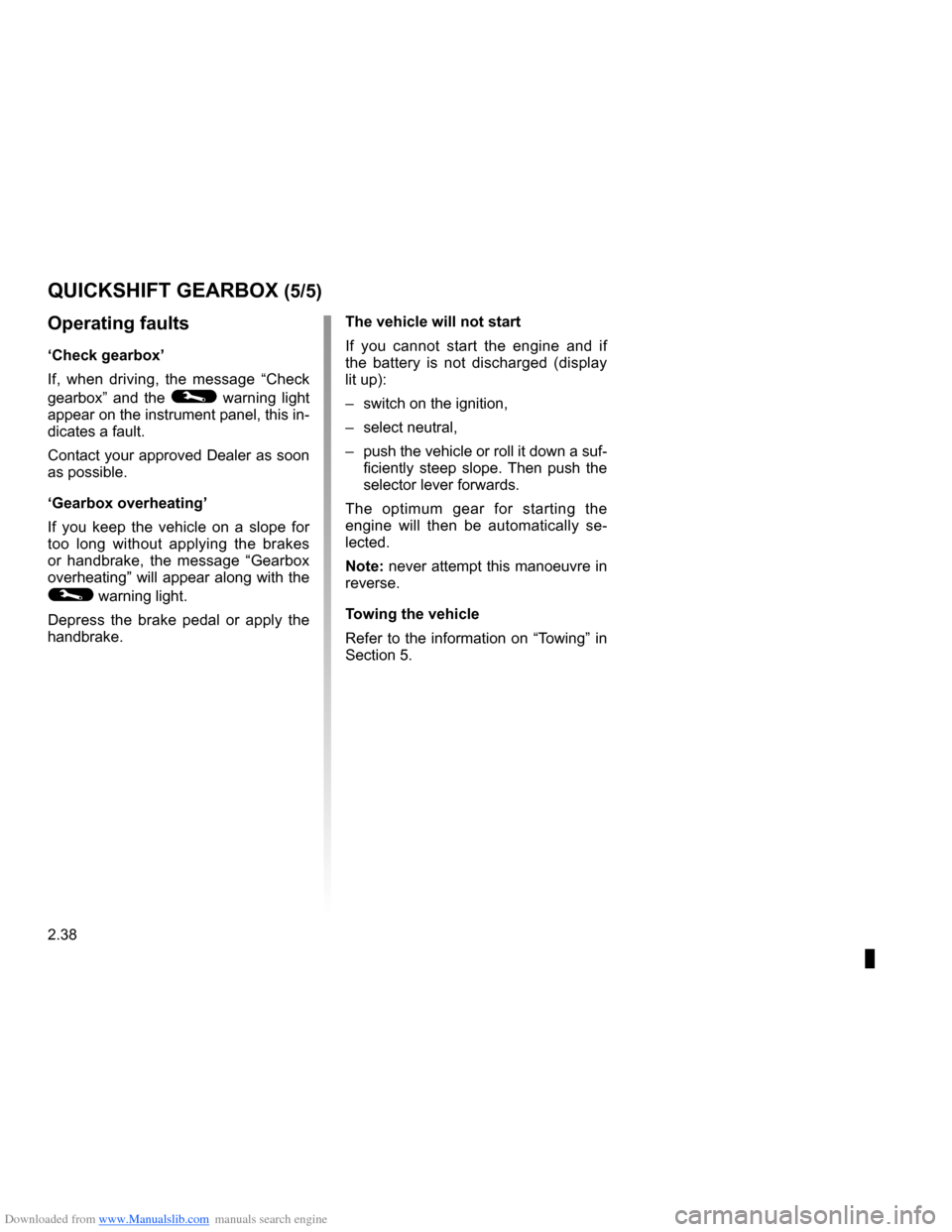
Downloaded from www.Manualslib.com manuals search engine
2.38
ENG_UD12578_2Boîte de vitesses Quickshift (X85 - B85 - C85 - S85 - K85 - Renault)\
ENG_NU_853-3_BCSK85_Renault_2
QUICkSHIFT GEARBOX (5/5)
The vehicle will not start
If you cannot start the engine and if the battery is not discharged (display lit up):
– switch on the ignition,
– select neutral,
– push the vehicle or roll it down a suf
- ficiently steep slope. Then push the selector lever forwards.
The optimum gear for starting the engine will then be automatically se- lected.
Note: never attempt this manoeuvre in reverse.
Towing the vehicle
Refer to the information on “Towing” in Section 5.
Operating faults
‘Check gearbox’
If, when driving, the message “Check
gearbox” and the © warning light appear on the instrument panel, this in- dicates a fault.
Contact your approved Dealer as soon as possible.
‘Gearbox overheating’
If you keep the vehicle on a slope for too long without applying the brakes or handbrake, the message “Gearbox overheating” will appear along with the
© warning light.
Depress the brake pedal or apply the handbrake.
Page 137 of 264
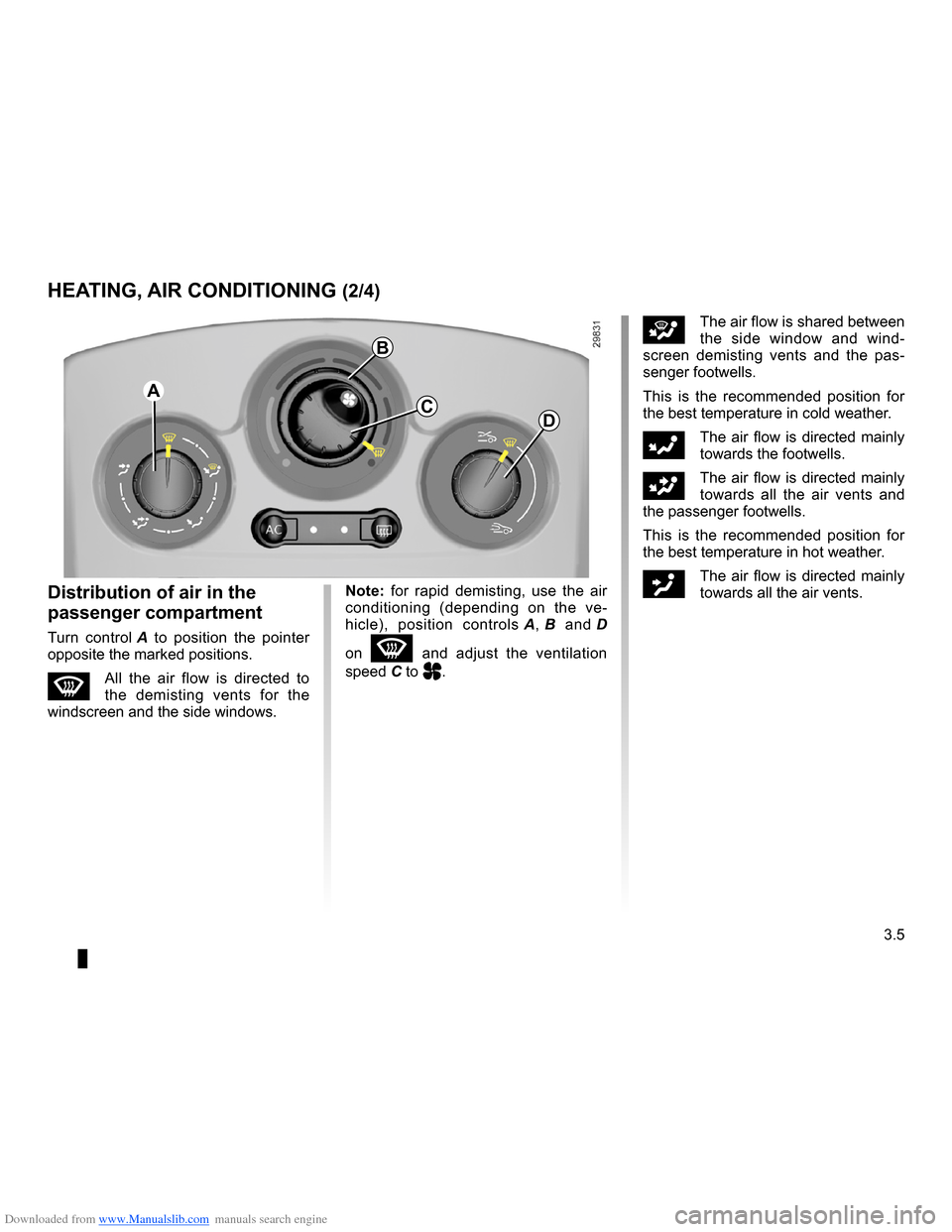
Downloaded from www.Manualslib.com manuals search engine
demistingwindscreen .......................................................(current page)
JauneNoirNoir texte
3.5
ENG_UD12673_2Chauffage / air conditionné (X85 - B85 - C85 - S85 - K85 - Renault)ENG_NU_853-3_BCSK85_Renault_3
iThe air flow is shared between the side window and wind- screen demisting vents and the pas- senger footwells.
This is the recommended position for the best temperature in cold weather.
FThe air flow is directed mainly towards the footwells.
GThe air flow is directed mainly towards all the air vents and the passenger footwells.
This is the recommended position for the best temperature in hot weather.
ôThe air flow is directed mainly towards all the air vents.Note: for rapid demisting, use the air conditioning (depending on the ve-
hicle), position controls A, B and D
on W and adjust the ventilation
speed
C to y.
Distribution of air in the
passenger compartment
Turn control A to position the pointer opposite the marked positions.
WAll the air flow is directed to the demisting vents for the windscreen and the side windows.
HEATING, AIR CONDITIONING (2/4)
A
B
CD
Page 139 of 264
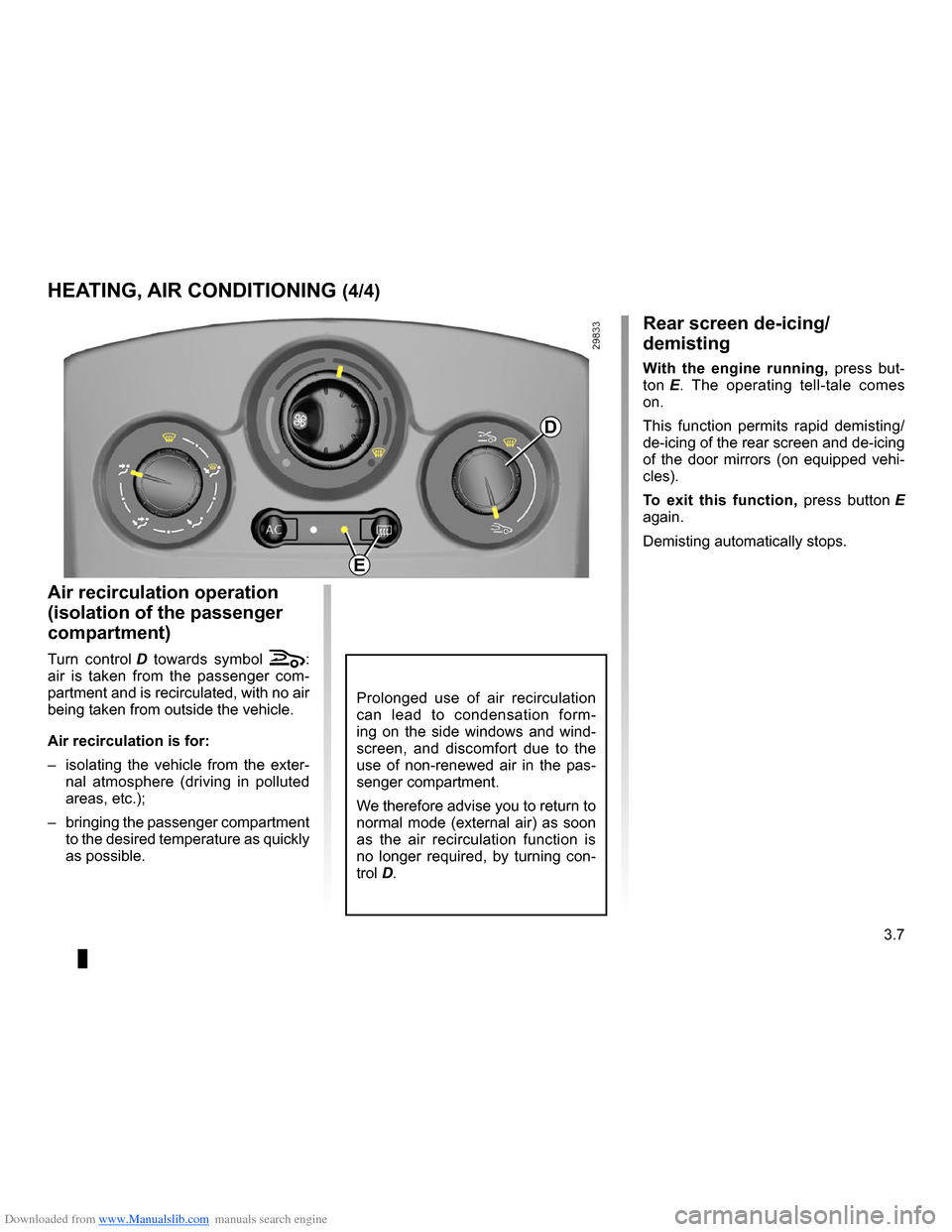
Downloaded from www.Manualslib.com manuals search engine
JauneNoirNoir texte
3.7
ENG_UD12673_2Chauffage / air conditionné (X85 - B85 - C85 - S85 - K85 - Renault)ENG_NU_853-3_BCSK85_Renault_3
Rear screen de-icing/
demisting
With the engine running, press but-
ton E. The operating tell-tale comes on.
This function permits rapid demisting/ de-icing of the rear screen and de-icing of the door mirrors (on equipped vehi- cles).
To exit this function, press button E again.
Demisting automatically stops.
Air recirculation operation
(isolation of the passenger
compartment)
Turn control D towards symbol á: air is taken from the passenger com- partment and is recirculated, with no air being taken from outside the vehicle.
Air recirculation is for:
– isolating the vehicle from the exter
- nal atmosphere (driving in polluted areas, etc.);
– bringing the passenger compartment
to the desired temperature as quickly as possible.
HEATING, AIR CONDITIONING (4/4)
Prolonged use of air recirculation can lead to condensation form- ing on the side windows and wind- screen, and discomfort due to the use of non-renewed air in the pas- senger compartment.
We therefore advise you to return to normal mode (external air) as soon as the air recirculation function is
no longer required, by turning con-
trol D.
D
E
Page 143 of 264
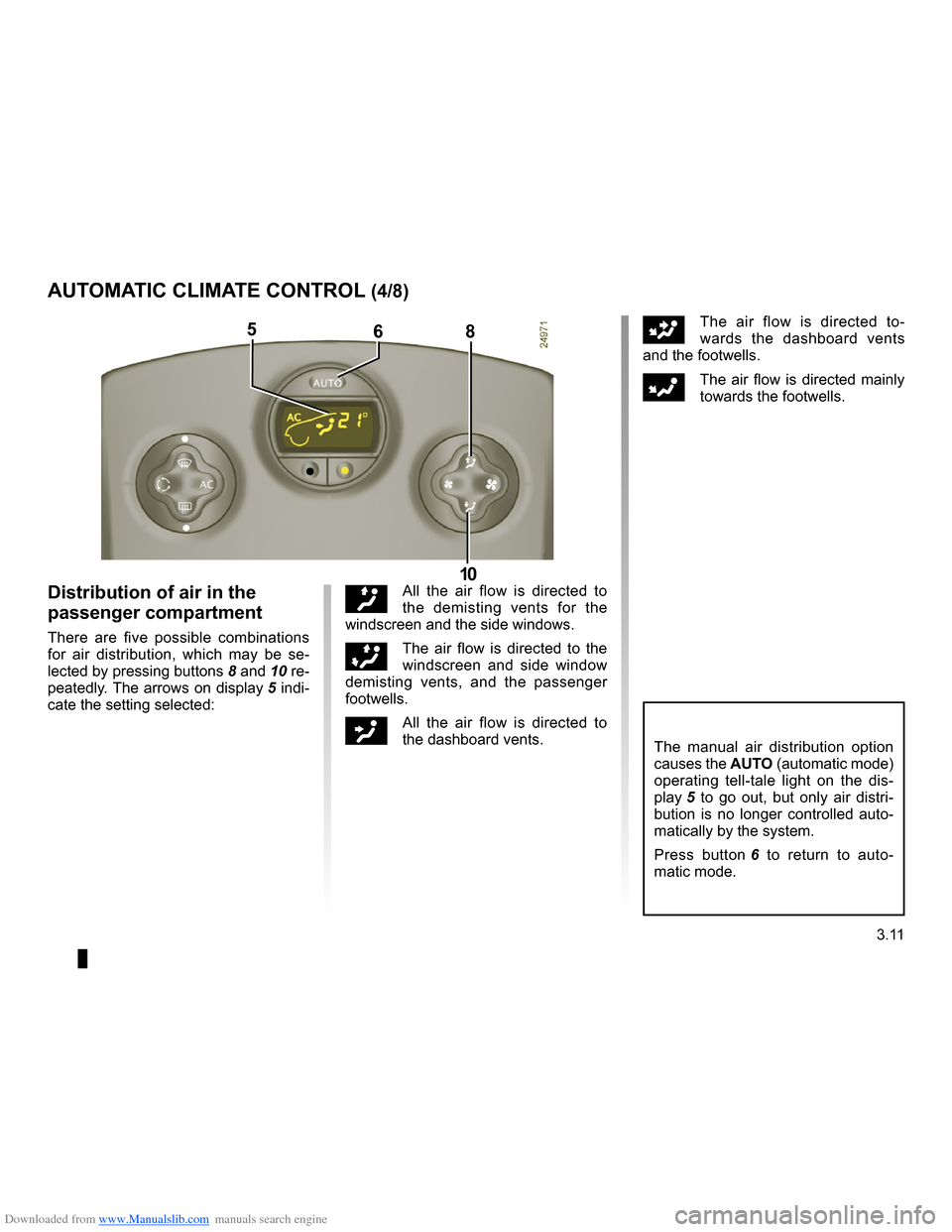
Downloaded from www.Manualslib.com manuals search engine
JauneNoirNoir texte
3.11
ENG_UD12579_2Air conditionné automatique (X85 - B85 - C85 - S85 - K85 - Renault)\
ENG_NU_853-3_BCSK85_Renault_3
GThe air flow is directed to- wards the dashboard vents and the footwells.
FThe air flow is directed mainly towards the footwells.
The manual air distribution option causes the AUTO (automatic mode) operating tell-tale light on the dis-
play 5 to go out, but only air distri- bution is no longer controlled auto- matically by the system.
Press button
6 to return to auto- matic mode.
õAll the air flow is directed to the demisting vents for the windscreen and the side windows.
÷The air flow is directed to the windscreen and side window demisting vents, and the passenger footwells.
ôAll the air flow is directed to the dashboard vents.
Distribution of air in the
passenger compartment
There are five possible combinations for air distribution, which may be se-
lected by pressing buttons 8 and 10 re-
peatedly. The arrows on display 5 indi- cate the setting selected:
AUTOMATIC CLIMATE CONTROL (4/8)
568
10
Page 148 of 264
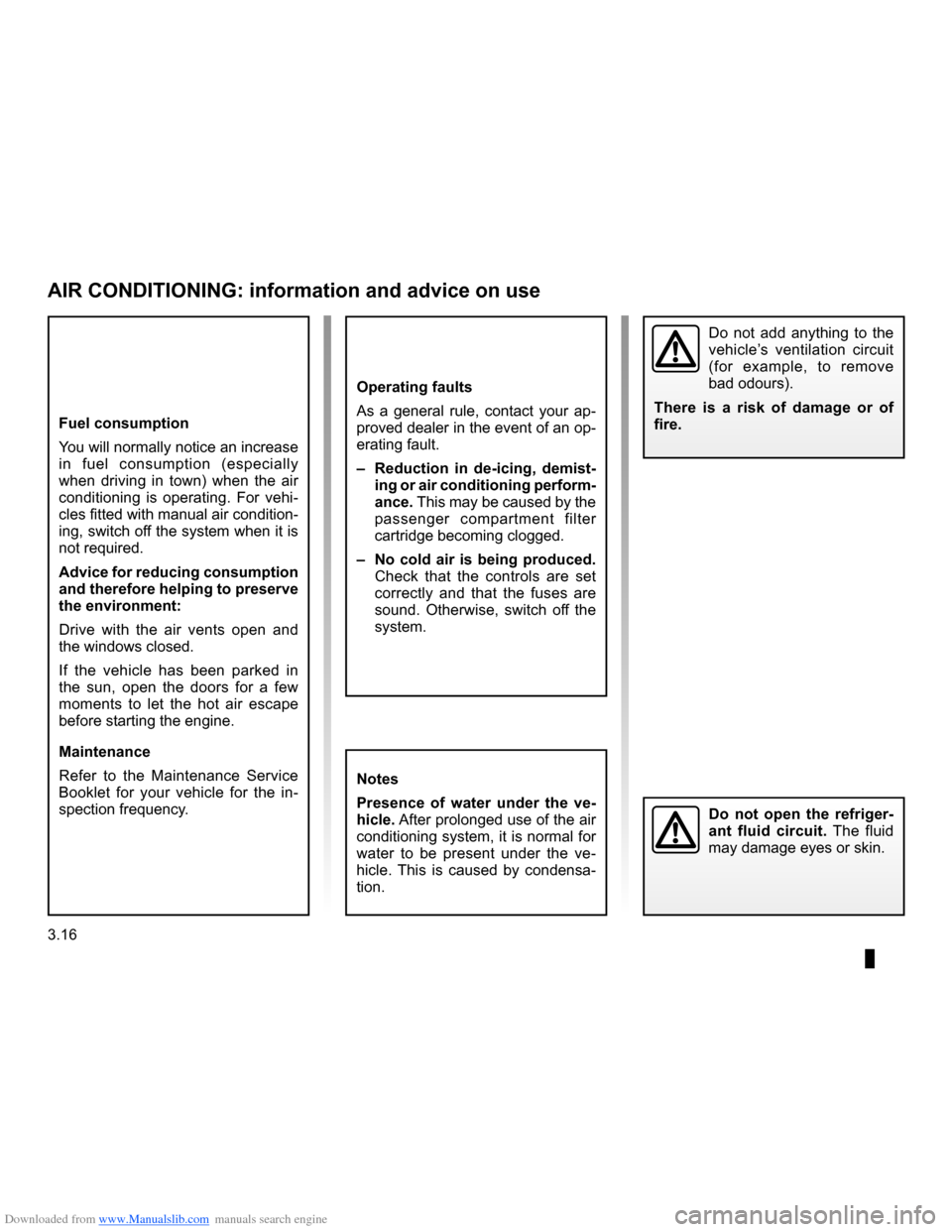
Downloaded from www.Manualslib.com manuals search engine
air conditioning .....................................(up to the end of the DU)heating system .....................................(up to the end of the DU)air conditioning .....................................(up to the end of the DU)temperature regulation .........................(up to the end of the DU)ventilation .............................................(up to the end of the DU)heating and air conditioning system ......................(current page)
3.16
ENG_UD10574_1Air conditionné : informations et conseils utilisation (X85 - B85 - \
C85 - S85 - K85 - Renault)ENG_NU_853-3_BCSK85_Renault_3
Air conditioning: information and advice on use
AIR CONDITIONING: information and advice on use
Fuel consumption
You will normally notice an increase in fuel consumption (especially when driving in town) when the air conditioning is operating. For vehi- cles fitted with manual air condition- ing, switch off the system when it is not required.
Advice for reducing consumption and therefore helping to preserve the environment:
Drive with the air vents open and the windows closed.
If the vehicle has been parked in the sun, open the doors for a few moments to let the hot air escape before starting the engine.
Maintenance
Refer to the Maintenance Service Booklet for your vehicle for the in- spection frequency.
Operating faults
As a general rule, contact your ap- proved dealer in the event of an op- erating fault.
– Reduction in de-icing, demist
- ing or air conditioning perform- ance. This may be caused by the passenger compartment filter cartridge becoming clogged.
– No cold air is being produced.
Check that the controls are set correctly and that the fuses are sound. Otherwise, switch off the system.
Do not open the refriger- ant fluid circuit. The fluid may damage eyes or skin.
Notes
Presence of water under the ve- hicle. After prolonged use of the air conditioning system, it is normal for water to be present under the ve- hicle. This is caused by condensa- tion.
Do not add anything to the vehicle’s ventilation circuit (for example, to remove bad odours).
There is a risk of damage or of fire.
Page 166 of 264
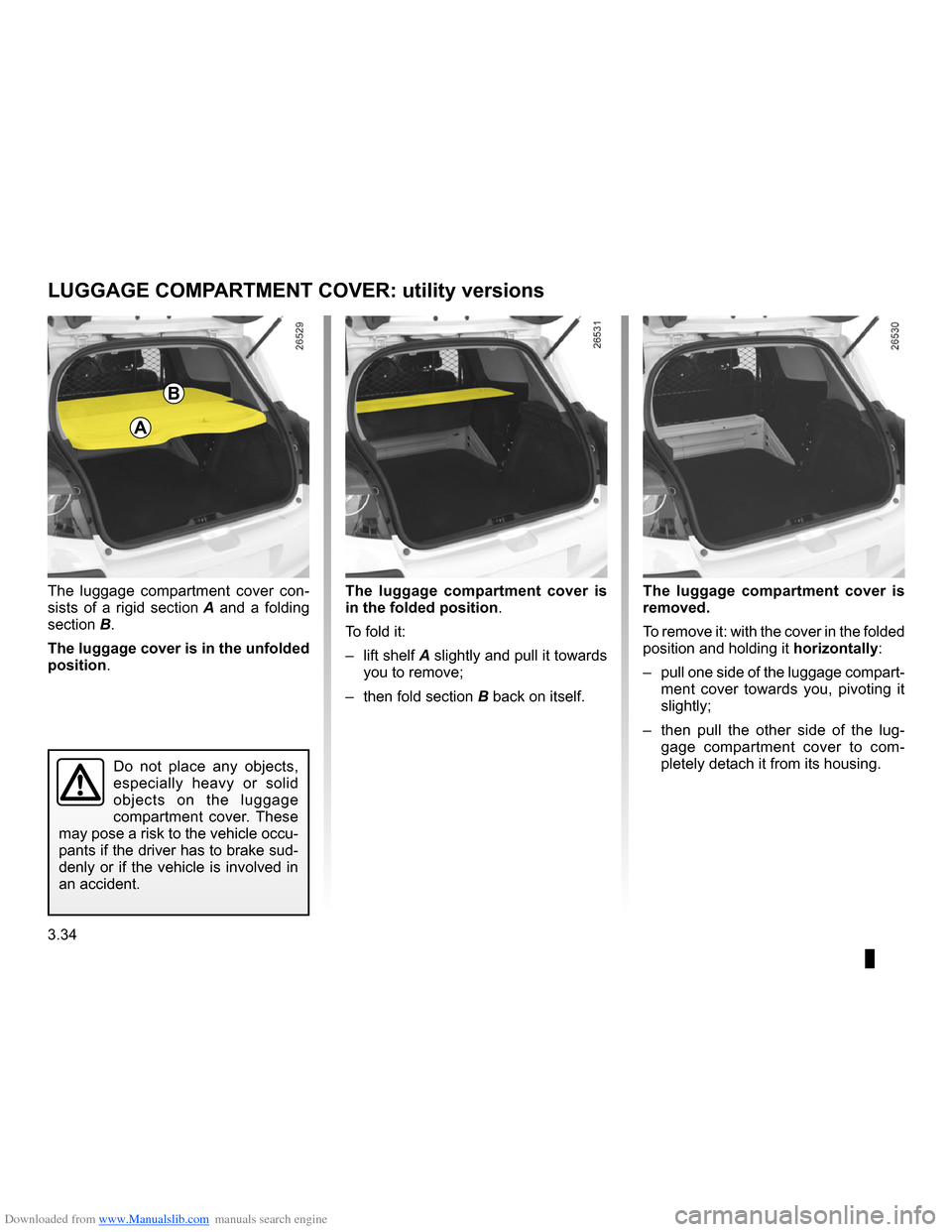
Downloaded from www.Manualslib.com manuals search engine
3.34
ENG_UD12582_2Cache-bagages (X85 - B85 - C85 - S85 - K85 - Renault)ENG_NU_853-3_BCSK85_Renault_3
The luggage compartment cover con-
sists of a rigid section A and a folding
section B.
The luggage cover is in the unfolded position.
The luggage compartment cover is removed.
To remove it: with the cover in the folded position and holding it horizontally:
– pull one side of the luggage compart
-ment cover towards you, pivoting it slightly;
– then pull the other side of the lug
-gage compartment cover to com-pletely detach it from its housing.
LUGGAGE COMPARTMENT COVER: utility versions
Do not place any objects, especially heavy or solid objects on the luggage compartment cover. These may pose a risk to the vehicle occu-pants if the driver has to brake sud-
denly or if the vehicle is involved in an accident.
The luggage compartment cover is in the folded position.
To fold it:
– lift shelf
A slightly and pull it towards you to remove;
– then fold section
B back on itself.
A
B
Page 167 of 264
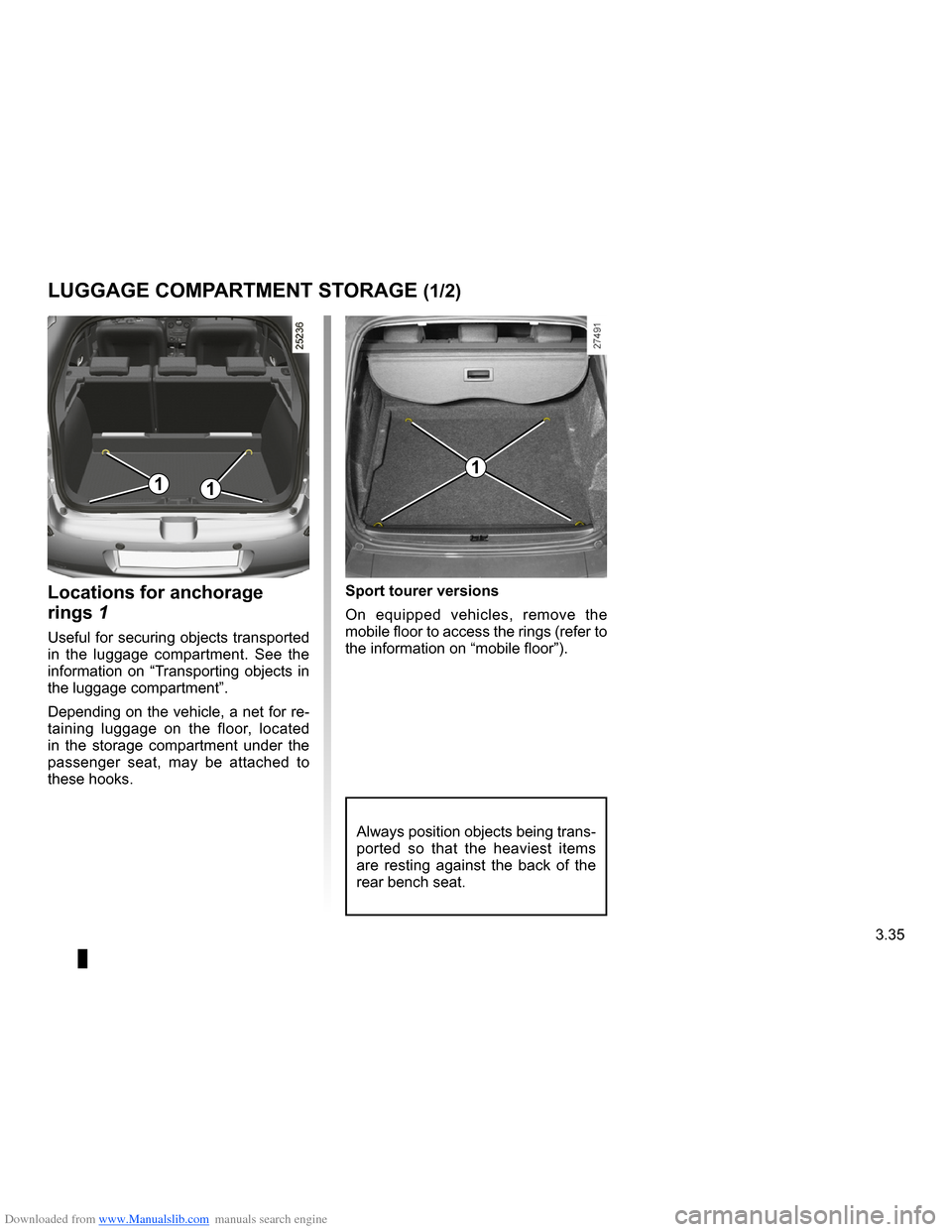
Downloaded from www.Manualslib.com manuals search engine
towing rings ..........................................(up to the end of the DU)tailgate ..................................................(up to the end of the DU)
3.35
ENG_UD10842_1Aménagements coffre à bagages (X85 - B85 - C85 - S85 - K85 - Renault)ENG_NU_853-3_BCSK85_Renault_3
Luggage compartment storage
Locations for anchorage
rings
1
Useful for securing objects transported in the luggage compartment. See the information on “Transporting objects in the luggage compartment”.
Depending on the vehicle, a net for re- taining luggage on the floor, located in the storage compartment under the
passenger seat, may be attached to these hooks.
LUGGAGE COMPARTMENT STORAGE (1/2)
Sport tourer versions
On equipped vehicles, remove the mobile floor to access the rings (refer to the information on “mobile floor”).
11
1
Always position objects being trans- ported so that the heaviest items are resting against the back of the rear bench seat.
Page 184 of 264
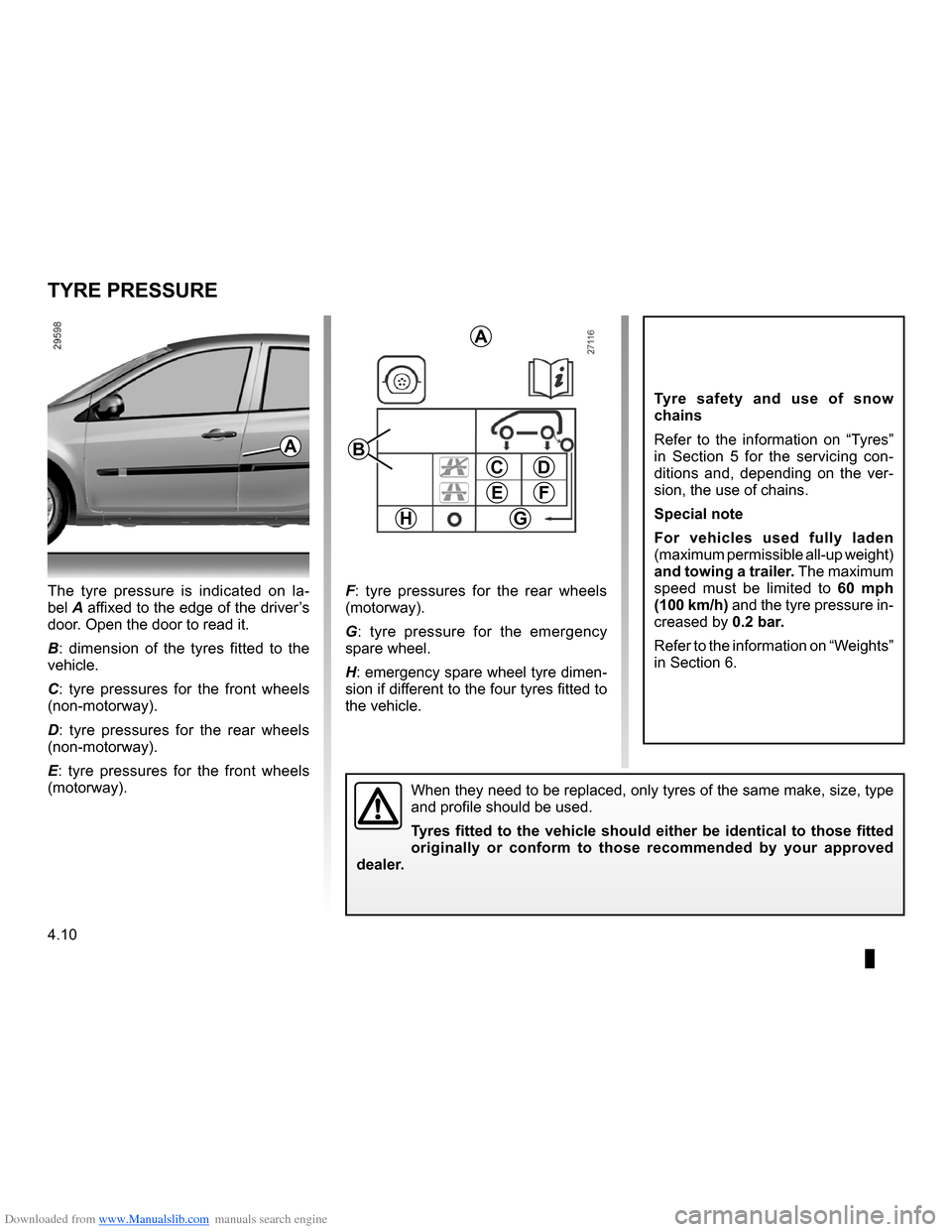
Downloaded from www.Manualslib.com manuals search engine
4.10
ENG_UD12587_2Pression de gonflage des pneumatiques (X85 - B85 - C85 - S85 - K85 - Re\
nault)ENG_NU_853-3_BCSK85_Renault_4
Tyre pressure
TyRE pRESSURE
The tyre pressure is indicated on la-
bel A affixed to the edge of the driver’s door. Open the door to read it.
B: dimension of the tyres fitted to the vehicle.
C: tyre pressures for the front wheels (non-motorway).
D: tyre pressures for the rear wheels (non-motorway).
E: tyre pressures for the front wheels (motorway).
F: tyre pressures for the rear wheels (motorway).
G: tyre pressure for the emergency spare wheel.
H: emergency spare wheel tyre dimen- sion if different to the four tyres fitted to the vehicle.
Tyre safety and use of snow chains
Refer to the information on “Tyres” in Section 5 for the servicing con- ditions and, depending on the ver- sion, the use of chains.
Special note
For vehicles used fully laden (maximum permissible all-up weight) and towing a trailer. The maximum speed must be limited to 60 mph (100 km/h) and the tyre pressure in- creased by 0.2 bar.
Refer to the information on “Weights” in Section 6.
When they need to be replaced, only tyres of the same make, size, type and profile should be used.
Tyres fitted to the vehicle should either be identical to those fitted originally or conform to those recommended by your approved dealer.
A
B
CD
FE
GH
A
Page 189 of 264
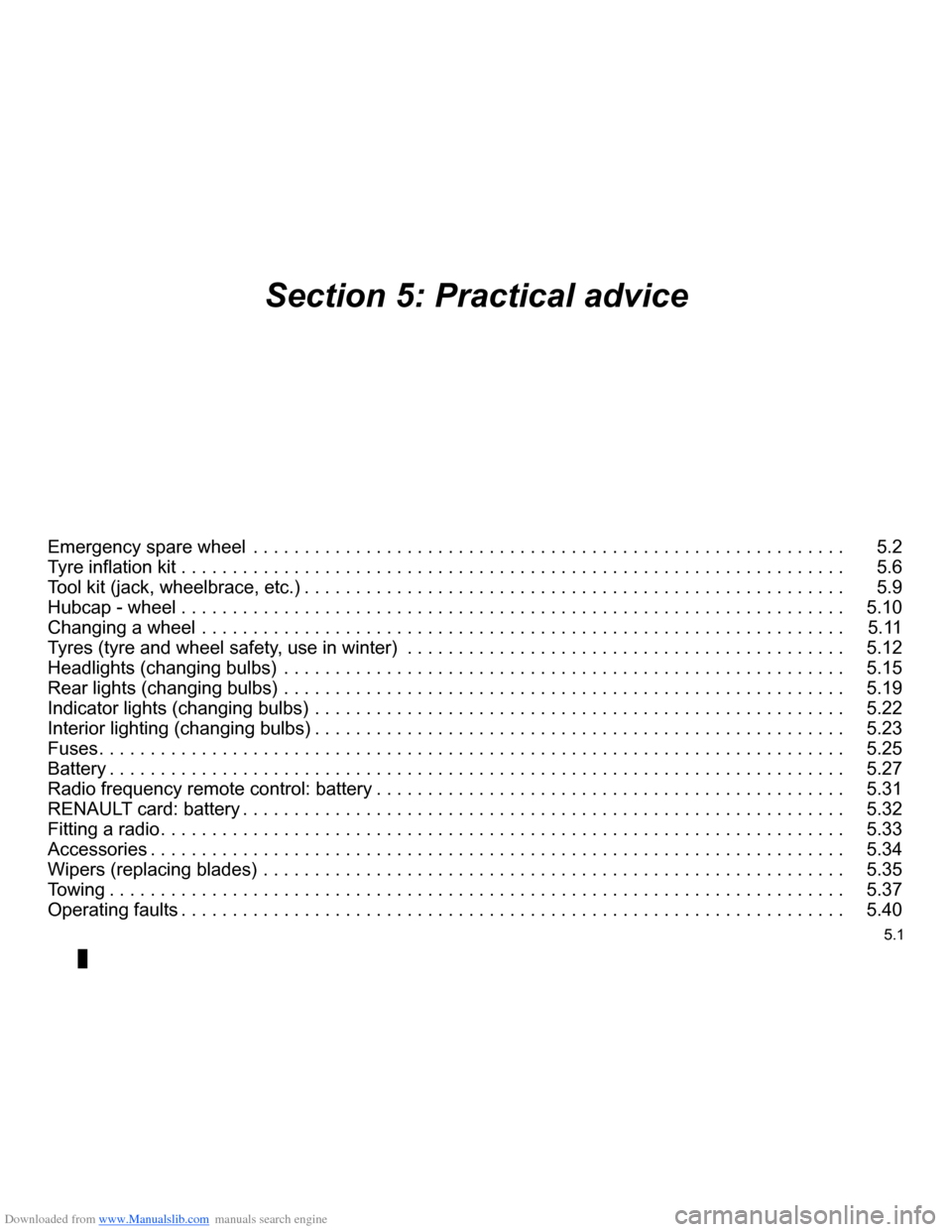
Downloaded from www.Manualslib.com manuals search engine
5.1
ENG_UD14715_4Sommaire 5 (X85 - B85 - C85 - S85 - K85 - Renault)ENG_NU_853-3_BCSK85_Renault_5
Section 5: Practical advice
Emergency spare wheel . . . . . . . . . . . . . . . . . . . . . . . . . . . . . . . . . . . .\
. . . . . . . . . . . . . . . . . . . . . . 5.2
Tyre inflation kit . . . . . . . . . . . . . . . . . . . . . . . . . . . . . . . . . . . .\
. . . . . . . . . . . . . . . . . . . . . . . . . . . . . 5.6
Tool kit (jack, wheelbrace, etc.) . . . . . . . . . . . . . . . . . . . . . . . . . . . . . . . . . . . . \
. . . . . . . . . . . . . . . . . 5.9
Hubcap - wheel . . . . . . . . . . . . . . . . . . . . . . . . . . . . . . . . . . . .\
. . . . . . . . . . . . . . . . . . . . . . . . . . . . . 5.10
Changing a wheel . . . . . . . . . . . . . . . . . . . . . . . . . . . . . . . . . . . .\
. . . . . . . . . . . . . . . . . . . . . . . . . . . 5.11
Tyres (tyre and wheel safety, use in winter) . . . . . . . . . . . . . . . . . . . . . . . . . . . . . . . . . . . .\
. . . . . . . 5.12
Headlights (changing bulbs) . . . . . . . . . . . . . . . . . . . . . . . . . . . . . . . . . . . .\
. . . . . . . . . . . . . . . . . . . 5.15
Rear lights (changing bulbs) . . . . . . . . . . . . . . . . . . . . . . . . . . . . . . . . . . . .\
. . . . . . . . . . . . . . . . . . . 5.19
Indicator lights (changing bulbs) . . . . . . . . . . . . . . . . . . . . . . . . . . . . . . . . . . . .\
. . . . . . . . . . . . . . . . 5.22
Interior lighting (changing bulbs) . . . . . . . . . . . . . . . . . . . . . . . . . . . . . . . . . . . . \
. . . . . . . . . . . . . . . . 5.23
Fuses . . . . . . . . . . . . . . . . . . . . . . . . . . . . . . . . . . . . \
. . . . . . . . . . . . . . . . . . . . . . . . . . . . . . . . . . . . \
. 5.25
Battery . . . . . . . . . . . . . . . . . . . . . . . . . . . . . . . . . . . . \
. . . . . . . . . . . . . . . . . . . . . . . . . . . . . . . . . . . . 5.27
Radio frequency remote control: battery . . . . . . . . . . . . . . . . . . . . . . . . . . . . . . . . . . . . \
. . . . . . . . . . 5.31
RENAULT card: battery . . . . . . . . . . . . . . . . . . . . . . . . . . . . . . . . . . . . \
. . . . . . . . . . . . . . . . . . . . . . . 5.32
Fitting a radio . . . . . . . . . . . . . . . . . . . . . . . . . . . . . . . . . . . . \
. . . . . . . . . . . . . . . . . . . . . . . . . . . . . . . 5.33
Accessories . . . . . . . . . . . . . . . . . . . . . . . . . . . . . . . . . . . . \
. . . . . . . . . . . . . . . . . . . . . . . . . . . . . . . . 5.34
Wipers (replacing blades) . . . . . . . . . . . . . . . . . . . . . . . . . . . . . . . . . . . .\
. . . . . . . . . . . . . . . . . . . . . 5.35
Towing . . . . . . . . . . . . . . . . . . . . . . . . . . . . . . . . . . . . \
. . . . . . . . . . . . . . . . . . . . . . . . . . . . . . . . . . . . 5.37
Operating faults . . . . . . . . . . . . . . . . . . . . . . . . . . . . . . . . . . . . \
. . . . . . . . . . . . . . . . . . . . . . . . . . . . . 5.40